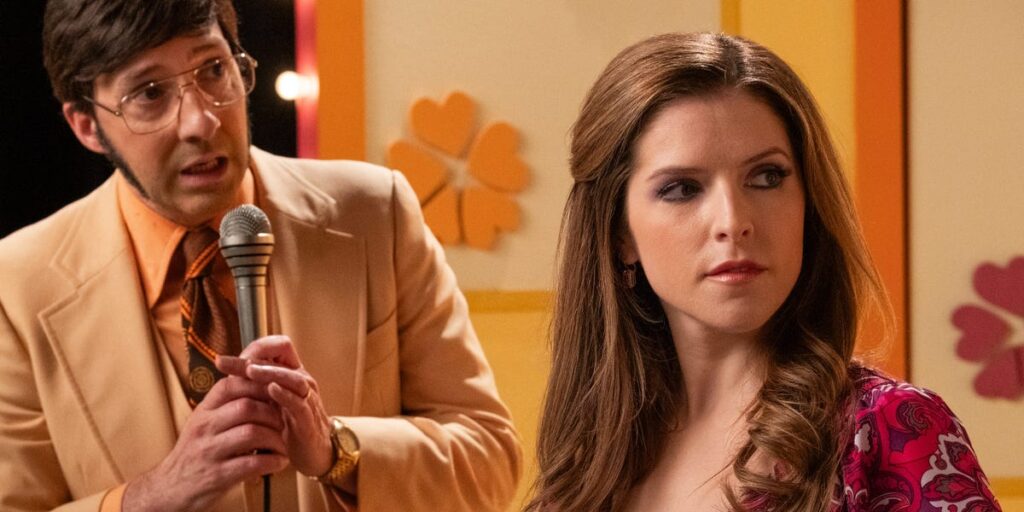- Netflix’s new film “Woman of the Hour” is based on a true story about serial killer Rodney Alcala.
- In real life, Alcala competed on “The Dating Game” and won a date with bachelorette Cheryl Bradshaw.
- Bradshaw declined to go on the date because she thought Alcala was creepy.
The chilling, real story of serial killer Rodney Alcala competing on (and winning) an episode of the reality show “The Dating Game” is the basis of Netflix’s new film “Woman of the Hour.”
“Woman of the Hour,” starring Anna Kendrick as Sheryl and Daniel Zovatto as Rodney, is a fictional retelling of Cheryl Bradshaw’s brush with Alcala on an episode of the aforementioned ABC dating show.
The movie is the latest to feed into the public’s appetite for true crime and Netflix’s reputation as a hub for documentaries and dramas inspired by real crimes. Most recently, the streamer found success with Ryan Murphy’s “Monsters: The Lyle And Erik Menendez Story,” which topped Luminate‘s weekly ranking of streaming original viewership with 2.7 billion minutes watched during its first full week on Netflix.
“Woman of the Hour,” which is also Kendrick’s directorial debut, changes some details of the story but the premise is largely similar to the real encounter.
Here’s what happened to the real Bradshaw and how she narrowly escaped being one of Alcala’s victims.
Alcala met Bradshaw on ‘The Dating Game’ after he had already been imprisoned twice and was on the FBI’s 10 Most Wanted Fugitives list.
On September 13, 1978, Bradshaw and Alcala both appeared on “The Dating Game,” a show in which one bachelorette asks three eligible bachelors a series of questions before choosing one to go on a date with. As part of the game, a partition divides the woman from the contestants until after a winner has been picked, so she can’t base her decision on looks.
At the time of his appearance on the show, Alcala had already murdered five women, attempted to murder an 8-year-old girl named Tali Shapiro, and was on the FBI’s top 10 most wanted fugitives list. He had also served 34 months for the child molestation of Shapiro and then spent two and a half years in prison for giving drugs to a 13-year-old girl.
But “The Dating Game” didn’t do a background check, and Alcala made it onto national television. He later got the nickname “The Dating Game Killer.”
During an interview with ABC News for an episode of “20/20,” Michael Metzger, an executive producer of “The Dating Game,” said that he wasn’t in favor of Alcala being on the show.
“I noticed that he had a very strange personality,” Metzger said.
But Ellen Metzger, the show’s contestant coordinator and wife of Metzger, found Alcala attractive and thought women would love him.
Alcala turned out to be a hit with the audience. He appeared as Bachelor No. 1 and was described as a “successful photographer” who enjoyed skydiving and motorcycling in his spare time.
Bradshaw, a drama teacher, asked the men open-ended questions that could elicit raunchy answers — and Alcala passed with flying colors.
At one point, Bradshaw asked, “What’s your best time?”
“The best time is at night,” Alcala responded, adding that nighttime is “When it really gets good.”
Bradshaw later asked, “I am serving you for dinner. What are you called and what do you look like?”
In response, Alcala smoothly said, “I’m called ‘The banana’ and I look really good.”
When Bradshaw asked him to be more descriptive, he said, “Peel me.”
In retrospect, Alcala’s answers were even more eerie considering the crimes he committed.
Bradshaw never went on a date with Alcala, which ended up saving her life.
When it came time to choose a winner, Bradshaw picked Alcala. The pair were supposed to get tennis lessons as part of their date, followed by a trip to Magic Mountain, the Six Flags amusement park in California.
But Bradshaw had an intuition about Alcala and backed out of the date.
“I started to feel ill. He was acting really creepy,” Bradshaw told The Sunday Telegraph in 2012. “I turned down his offer. I didn’t want to see him again.”
Contestant coordinator Ellen Metzger told “20/20” that the day after appearing on “The Dating Game,” Bradshaw called the office and told her, “I can’t go out with this guy. There’s weird vibes that are coming off of him. He’s very strange. I’m not comfortable. Is that going to be a problem?”
“And, of course, I said no,” Ellen said.
Bradshaw wasn’t the only one who thought that Alcala was creepy. Jed Mills, who competed as Bachelor No. 2, said that he quickly clocked Alcala’s weirdness.
“In the green room, he jumps in and he says, ‘I always get my girl,'” Mills said, adding that he “immediately did not like this guy.”
Bradshaw’s inkling about Alcala saved her from being his next target. Since appearing on “The Dating Game,” Bradshaw has kept a low profile and little is known about where she ended up.
A title card at the end of “Woman of the Hour” says that Bradshaw “left California to live a private life and raise a family.”
Alcala died of natural causes on July 24, 2021.
Two years after his appearance on “The Dating Game,” Alcala was convicted and sentenced to death for the murder of 12-year-old Robin Samsoe.
He was put on death row in San Quentin State Prison, but the verdict was overturned by the California Supreme Court. In the 1986 retrial, Alcala was again found guilty and sentenced to death. But the ruling was overturned in 2001.
During his third trial in 2010, Alcala represented himself. He was convicted of the murders of Samsoe, Jill Barcomb, Georgia Wixted, Charlotte Lamb, and Jill Parenteau. Alcala was sentenced to death and was later convicted of two additional murders that took place in New York.
California placed a moratorium on the death penalty in 2019, and Alcala stayed at Corcoran State Prison until his death of natural causes in July 2021. Alcala was 77. According to the Associated Press, authorities estimated that Alcala might have killed 130 people across the US, but the true number is unknown.
Read the full article here
















